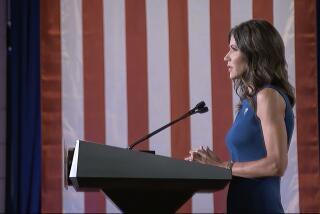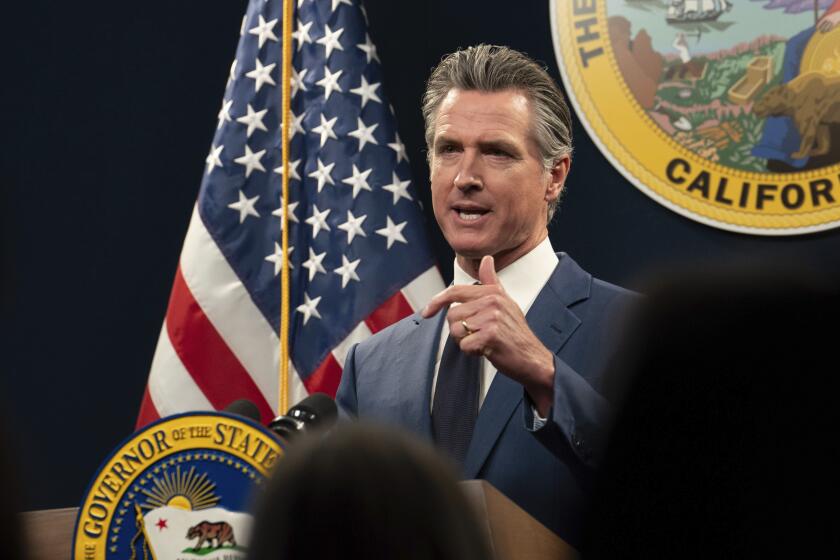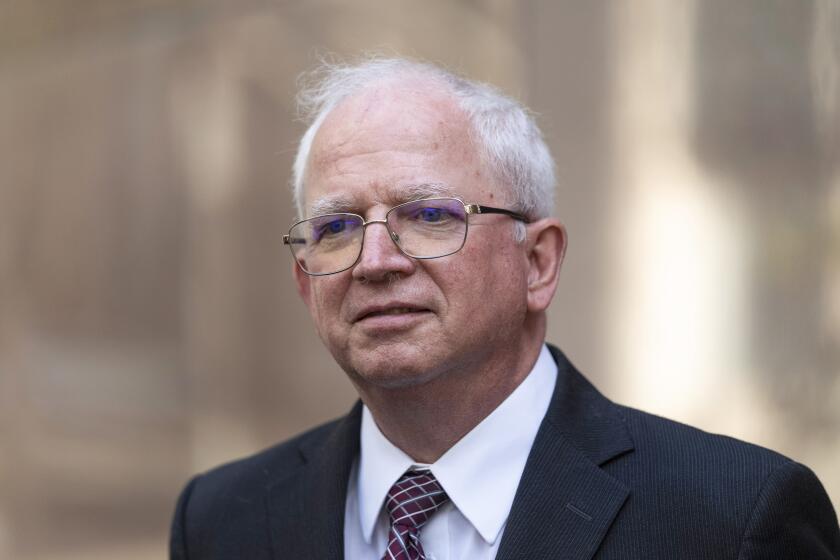Mideast Talks Focus on Security
The Bush administration held high-level talks with Palestinian leaders Thursday to try to end the impasse in the Mideast peace process, with the primary focus on security issues.
Secretary of State Colin L. Powell described the talks as “a good exchange” and said President Bush intended to prod both the Palestinians and the Israelis toward renewed negotiations, despite recent setbacks and escalating violence.
“I reaffirmed to the ministers that the president is committed to doing everything possible to find a way forward, recognizing the difficulties that exist and condemning the violence that afflicts the region and occasionally thwarts our ability to move forward,” Powell said after meeting with the three-man delegation.
“But we will not be deterred. We will continue to move forward.”
The discussions at the White House and the State Department centered on the Palestinians’ “new thinking” on restructuring security forces and on ending the cycle of violence, according to Palestinian Authority Interior Minister Abdel Razak Yehiyeh.
Yehiyeh outlined plans to streamline the maze of Palestinian security organizations, including personnel changes in the highest positions, at a meeting at the Brookings Institution, a centrist public policy center here.
Yehiyeh said he and others were also trying to reach out to Palestinian youths, particularly in refugee camps in the West Bank and the Gaza Strip, to prevent them from being lured by the religious ideology or extremist tactics of the militant groups Hamas and Islamic Jihad.
But any prospect of building “a new state of mind” would depend on a decision by Israel to begin withdrawal from occupied lands, he said.
Yehiyeh, a former head of the Palestine Liberation Army, warned that Israel’s current tactics--which he said were based on “reaction and revenge”--would not stop the suicide bombings and other attacks, and could backfire.
“The cycle of violence will continue. Using force alone will never stop violence,” the new security chief said.
Yehiyeh called for at least a partial Israeli withdrawal to lift the siege on the West Bank and give Palestinians room to take steps.
“If the Israelis begin to withdraw, many things will change, and what now is thought to be difficult will be easy,” he said.
The delegation, which also includes chief Palestinian negotiator Saeb Erekat and Economy and Trade Minister Maher Masri, is scheduled to meet Saturday with CIA Director George J. Tenet to discuss details of a new security plan.
Both Yehiyeh and Masri have been praised by the State Department for their efforts to provide new direction and institute needed reforms.
The focus of talks today will be on the humanitarian plight of Palestinians after months of living under siege and curfew. Erekat warned that the situation in the areas controlled by the Palestinian Authority is nearing catastrophic proportions.
The 3.3 million Palestinians “live in the biggest prison in the world” and “are on the brink of starvation,” he said. Roughly half of Palestinian children under age 5 face malnutrition, while many women are anemic, Erekat said at a joint news conference with Powell. A third of Palestinians live on handouts, Erekat said.
One issue not on the agenda during talks Thursday at the White House with National Security Advisor Condoleezza Rice was Palestinian Authority President Yasser Arafat, according to U.S. officials. In his June 24 speech, Bush called for new leadership and major reforms as preconditions to the creation of a Palestinian state in three years.
After the first of three days of talks, however, Erekat said the team had been “fully mandated” by Arafat. “We are not a delegation of freelancers,” he said.
In a tweak at the Bush administration, Erekat also told reporters that the Palestinians’ new reform efforts were not being undertaken simply to meet Bush’s demands.
“I would like to say to the secretary that the Palestinian reform is Palestinian reform. It’s done for Palestinian interests by Palestinian will, and it’s not being dictated by anybody,” Erekat said.
More to Read
Get the L.A. Times Politics newsletter
Deeply reported insights into legislation, politics and policy from Sacramento, Washington and beyond. In your inbox three times per week.
You may occasionally receive promotional content from the Los Angeles Times.






